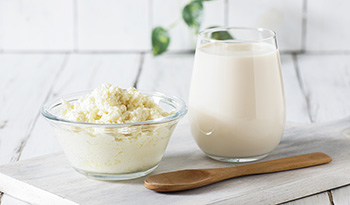All You Need To Know About Inflammation

What Is Inflammation?
Inflammation is the body’s natural response to injury, illness, exposure to toxins, or certain diet and lifestyle habits. Inflammation results when the immune system creates an inflammatory response to help defend the body against harmful substances and aid its natural healing process.
While inflammation is a natural response to acute or short-term situations, subacute or chronic inflammation can increase the risk of various health conditions and accelerate the aging process:
- Acute inflammation: This type of inflammation results from a virus or minor injury and lasts two weeks or less.
- Subacute inflammation: Subacute inflammation is the phase between acute and chronic inflammation, typically lasting between two to six weeks. It is often linked to unhealthy lifestyle and dietary choices, gut dysbiosis, and chronic stress.
- Chronic inflammation: Chronic inflammation occurs when an inflammatory response is ongoing, lasting longer than 6 weeks. Chronic inflammation is a precursor and risk factor for many diseases, including autoimmune diseases, heart disease, and certain types of cancer.1,2
Symptoms Of Inflammation
Inflammation can lead to both internal and external symptoms, such as:
- Discolored, red, or flushed skin
- Heat, skin feeling hot to the touch
- Pain or tenderness
- Swelling
- Loss of function or range of motion
- Abdominal pain
- Constipation
- Diarrhea
- Gut dysbiosis
- Anxiety
- Depression
- Brain fog
- Chest pain
- Insomnia
- Fever
- Mouth sores
- Skin rash
- Weight gain or loss
- Frequent infections or illnesses
Causes Of Inflammation
Inflammation is complex. Many root causes can trigger both acute and chronic inflammation, such as diet, lifestyle, medications, certain health conditions, and more. The most common causes of inflammation include:
- Smoking and tobacco use
- Exposure to toxins like pollution, hazardous waste, or industrial chemicals
- Chronic stress
- Gut dysbiosis
- Low levels of physical movement and exercise
- Poor sleep
- Obesity
- Alcohol
- Certain foods, including sugar, refined carbohydrates, and trans fats
Health Risks Of Chronic Inflammation
Chronic, on-going inflammation can damage healthy cells, tissues, and organs, increasing the risk of heart disease, autoimmune conditions, diabetes, rheumatoid arthritis, allergic asthma, Alzheimer's disease, chronic kidney disease (CKD), inflammatory bowel disease (IBD), various types of cancer, and accelerated aging.2
How Is Inflammation Diagnosed?
Systemic inflammation is typically diagnosed through a series of blood tests that may include serum protein electrophoresis (SPEP), C-reactive protein (CRP), erythrocyte sedimentation rate (ESR), and fibrinogen:
- C-reactive protein (CRP): This most well-known blood test for inflammation tests CRP levels, which are naturally produced in the liver in response to inflammation.
- Serum protein electrophoresis (SPEP): This test separates proteins based on their electrical charge and size, and can reveal changes that may indicate inflammation.
- Erythrocyte sedimentation rate (ESR): This test measures the rate at which red blood cells sink in a test tube of blood. Red blood cells that sink quickly may indicate inflammation.
- Fibrinogen: A fibrinogen test measures the amount of fibrinogen, a protein that plays a key role in blood clotting, in your blood. Elevated levels of fibrinogen may indicate acute inflammation, such as injury or tissue damage.
Anti-Inflammatory Remedies
Chronic inflammation can significantly damage health, but a number of dietary and lifestyle factors can reduce or stop chronic inflammation. The best ways to naturally decrease inflammation include:
- Anti-inflammatory diet: A whole foods diet that minimizes processed foods high in added sugar, salt, and artificial ingredients is key for minimizing inflammation. Certain foods can actually help fight inflammation, including foods high in omega-3 fats like salmon, chia seeds, and walnuts. Foods high in antioxidants, like berries, garlic, green tea, and dark leafy greens, can also fight inflammation. Herbs and spices known to fight inflammation include ginger and turmeric.
- Targeted supplements: Zinc, vitamin C, curcumin (the active ingredient in turmeric), and omega-3 fats may help fight inflammation, improve gut health, and support the body’s natural detoxification system.
- Adequate sleep: Lack of sleep increases proinflammatory cytokines and reduces immune function.3 Aim for eight to nine hours of consistent sleep every evening.
- Regular exercise: A sedentary lifestyle increases the risk of obesity and accumulation of visceral fat, which may lead to low-grade, chronic inflammation. In addition to at least 150 minutes of movement and exercise per week, develop a lifestyle of everyday regular movement. This can include regularly standing or stretching after a period of sitting, gardening, walking, and being active beyond dedicated times of exercise.
- Stress management: Chronic stress activates the hypothalamic-pituitary-adrenal (HPA) axis, releasing hormones that stimulate an inflammatory response. Stress also increases cortisol levels, and chronically elevated cortisol levels can increase inflammation.
- Reduced toxic load: From pollution and contaminated water to pesticides in food, personal care items, and household cleaners, our detox organs are constantly working hard to process and eliminate harmful substances from our system. Exposure to a higher toxic load may increase the body’s natural inflammatory response. By switching to natural personal care products and household cleaners, avoiding items with added fragrance or perfumes, filtering your water, and eating a healthy diet, you decrease your toxic load and support your body’s natural detox organ — the liver! Liver-supporting foods include leafy greens, cruciferous vegetables, nuts, berries, and fatty fish.
In addition to healthy anti-inflammatory lifestyle choices, the following foods and supplements may help decrease inflammation.
Green Tea
Green tea contains the powerful antioxidant epigallocatechin-3-gallate (EGCG). EGCC helps inhibit inflammatory pathways, thereby reducing inflammation and fighting free radicals, which can damage healthy cells. To reap the benefits of this antioxidant, drink green tea or take EGCG as a supplement.
Beyond green tea, various teas also help reduce inflammation and impart other health benefits. Ginger, chamomile, lemon balm, and tulsi tea can help calm and support the nervous system and reduce stress. Peppermint and ginger tea can support digestion and bowel regularity. Green, dandelion, milk thistle, and turmeric teas all support liver function.
Magnesium
Magnesium may help lower inflammation by helping regulate calcium levels and decreasing levels of C-reactive protein.4 Food sources of magnesium include legumes, seeds like pumpkin seeds, cacao or dark chocolate, avocado, banana, spinach, and soy products like tofu.
Magnesium can also be taken as a supplement in a capsule or powdered drink mix. There are several forms of magnesium, each of which may help the body in different ways. Magnesium glycinate is best for supporting sleep and neurological health and may help improve symptoms of depression, anxiety, and memory loss. Magnesium citrate supports relaxation and bowel regularity and is best for those struggling with constipation. Magnesium carbonate may help soothe an upset stomach. Magnesium oxide, magnesium L-threonate, and magnesium malate are other common forms.
Omega-3s
Omega-3 fats are essential fatty acids that support brain and heart health and offer many other potential health benefits. Omega-3 days can also help decrease the production of eicosanoids, hormones involved in the inflammatory response.5
Your body cannot make omega-3s, so you must consume them through foods you eat or in a supplement, like a fish-oil capsule. Food sources of omega-3s include fatty fish, walnuts, chia seeds, flax seeds, hemp seeds, and seaweed.
Vitamin E
Vitamin E is a powerful antioxidant that can help fight free radicals and lower inflammation. Free radicals damage healthy cells, increasing the rate of inflammation. Food sources of vitamin E include almonds, hazelnuts, peanuts, sunflower seeds, leafy greens, and avocados. Vitamin E is also available as a supplement.
Vitamin B
B vitamins like B6 and B12 help reduce inflammation by naturally lowering C-reactive protein and homocysteine. Food sources of B vitamins include whole grains, nuts, seeds, leafy greens, legumes, meat, fish, eggs, and dairy products. B vitamins can also be consumed through supplements, including isolated B-vitamin or B-complex supplements or multivitamins.
Olive Oil
Olive oil is rich in oleocanthal and polyphenols, antioxidants with anti-inflammatory properties. Olive oil can be used for cooking or in salad dressings, marinades, and sauces. For the best nutritional value, choose unrefined extra-virgin olive oil in a dark glass bottle that protects the oil from heat and light.
Turmeric
Turmeric is a root vegetable commonly used as a spice. It contains a natural compound known as curcumin, which may help fight inflammation. Pairing turmeric with black pepper helps increase the absorption of curcumin.
Turmeric adds depth of flavor, color, and powerful nutritional punch to a variety of recipes, from sweet to savory. Purchase turmeric root at the grocery store or farmers market, or use turmeric powder for cooking and baking. For a concentrated source of turmeric, try a turmeric or curcumin supplement.
Takeaway
Inflammation is the body’s natural healing response. However, chronic inflammation can increase the risk of disease and other health issues. Eating a diet rich in antioxidants and healthy fats, managing stress, exercising regularly, getting enough sleep, and incorporating anti-inflammatory supplements can help lower inflammation and support your health, both in the short and long term.
References:
- Pahwa R, Goyal A, Jialal I. Chronic Inflammation. Pathobiology of Human Disease: A Dynamic Encyclopedia of Disease Mechanisms. Published online August 7, 2023:300-314.
- Chavda VP, Feehan J, Apostolopoulos V. Inflammation: The Cause of All Diseases. Cells. 2024;13(22):1906. doi:10.3390/CELLS13221906
- How sleep deprivation can cause inflammation - Harvard Health. Accessed May 12, 2025.
- Simental-Mendia LE, Sahebkar A, Rodriguez-Moran M, Zambrano-Galvan G, Guerrero-Romero F. Effect of Magnesium Supplementation on Plasma C-reactive Protein Concentrations: A Systematic Review and Meta-Analysis of Randomized Controlled Trials. Curr Pharm Des. 2017;23(31).
- Calder PC. Omega‐3 polyunsaturated fatty acids and inflammatory processes: nutrition or pharmacology? Br J Clin Pharmacol. 2013;75(3):645.
DISCLAIMER:This Wellness Hub does not intend to provide diagnosis...















































































 Table of Contents
Table of Contents















